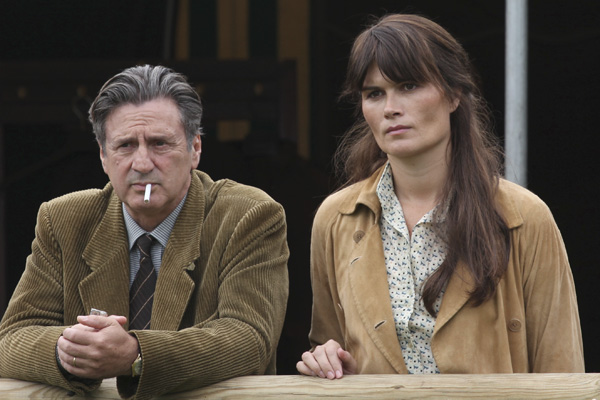
Daniel Auteuil and Marina Hands in JAPPELOUP (All photos: The Film Society of Lincoln Center)
As usual, the mid-winter Film Society of Lincoln Center mini-fest is strong in variety—an animated film here, a biopic there, some audience pleasing and others inscrutable—but it doesn’t necessarily represent the best of what France has to offer. Conspicuously missing in the lineup are the latest from star sourpuss Jean-Pierre Bacri in the droll rom-com Cherchez Hortense (with Kristen Scott Thomas, no less); Crawl, an award-winning coming-of-ager and a notable example of Slow Cinema; and the vibrantly unpredictable Tango Libre, co-written by its star, Anne Paulicevich, who plays the most original and needy femme fatale of recent years.
The inclusion of any of these three would have considerably enlivened this year’s lineup, which instead emphasizes several ponderous works—the rambling Rich is the Wolf; the 136-minute epic of navel gazing You, Me and Us; and the unfocused My Blue-Eyed Girl. As a result, this is one of the most uneven editions of the last 10 years. (The series is co-presented by Unifrance, the governmental agency promoting French film worldwide.)
Nevertheless, the series, in its 18th edition this year, offers plenty of stars in good films. Actor Daniel Auteuil, an annual presence, returns in the sports biopic Jappeloup, about an unruly horse-turned-showjumping champion and its rider, Pierre Durand, who wants only to do his dad proud. Auteuil plays the father to on-screen son Guillaume Canet, an actor who has also become one of the most commercially successful French filmmakers of his generation as the director of Tell No One and Little White Lies.
Like his on-screen counterpart, Canet’s family were horse breeders, and he trained as a show jumper before he gravitated toward acting. Yes, that’s Canet performing the stunts in the many jumping sequences. He also wrote the screenplay, which follows the familiar patterns of a sports movie with major victories and big reversals, but it pays exceptional attention to the motivations of son Pierre.
The drama really takes off during the competitions, filmed with an aerobic camera that moves everywhere—under the horse in mid-jump, right behind its tail, or following at ground level. Even if you’re not an equestrian, this is a knuckle-biter. For maximum suspense, don’t Google “Jappeloup” beforehand.
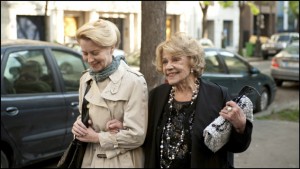
Laine Mägi, left, and Jeanne Moreau in A LADY IN PARIS
At 84, actress Jeanne Moreau gives out a dangerous and a high-voltage charge in the otherwise sweet and straightforward A Lady in Paris, a chamber piece by Estonian director Ilmar Raag. Moreau’s voracious and imperious Frida, a woman of both considerable wealth and a storied romantic past, is described as “free and easy.” So in short, this volatile role is tailor made for Moreau.
The title character, Anne (Laine Mägi), leaves behind the frigid cold of Estonia and her infantile, drunk ex-husband to restart her life as a caretaker for an elderly expat in Paris. Immediately upon arriving, Anna is forewarned that her employer, Frida, is cranky (essentially a drama queen), who says exactly what’s on her mind, and sure enough, Frida immediately fires Anne.
The film infectiously captures a wide-eyed newcomer experiencing the City of Lights—it doesn’t hurt that Anne lives and works in a swanky arrondissement, near the Arc de Triomphe—and she goes from frumpy to fashionable in no time (a Burberry trench coat does wonders). Impeccably dressed in Chanel and draped in pearls, Frida’s perception of herself couldn’t be more divergent from her frail, aging physicality, and the film forthrightly addresses her sexuality without making it a joke. (Moreau has hardly been away from the cameras; her bonhomie brought to life Manuel de Oliveira’s emotionally staid and slow-going Gebo and the Shadow last year.)
Other big names turn up, at least vocally, in the gorgeously animated The Day of the Crows, which is smart enough for adults and appealing for anyone with abandonment issues. It’s centered on a beguiling and untamed pug-nosed boy, Pumpkin Junior. The flying-swallowing wild child swings from tree limbs with ease, laps up hot chocolate like a ravenous dog, and communes with the spirits of the woods. He has been brought up in the forest by his hulking and stern ogre father, and kept far away from the dangerous World Beyond (civilization) until he has to venture out for help in the nearby village. Pumpkin Senior has been injured, but the boy’s main quest main is to find his ornery father’s love. The film weaves many themes—forgiveness, xenophobia, conformity—without preaching.
For his first solo effort, director Jean-Christophe Dessaint splashes all the hues of the color spectrum upon the screen. The landscapes, whether autumnal or covered in a winter blizzard, are lifelike (give or take a purple frog or two) without the slavish realism of more conventional fare, such as Brave.
Jean Reno gives voice to the ogre; Isabelle Carré (Hideaway) to Manon, the village girl who introduces the boy to clothes and personal hygiene (based on the reaction of the townspeople, he stinks); and Claude Chabrol to the paternal and patient doctor, in his last film contribution before his death in 2010. Good news: the film will also screen at the New York International Children’s Film Festival.
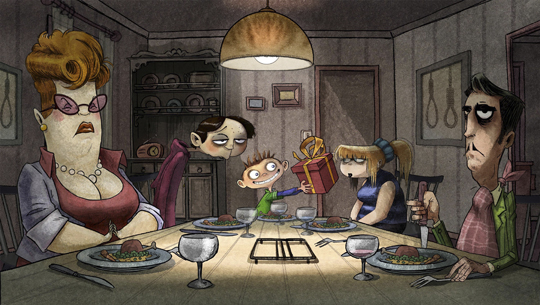
The Tuvache family of THE SUICIDE SHOP
Another animated film is a cure-all, bringing spirited life to the overall somber and serious programming: Patrice Leconte’s The Suicide Shop, in 3-D and a musical to boot. Its jaundiced point of view is clear from the opening sequence: a pigeon’s point of view flying over a grim and gray city landscape. As the bird flies between high-rise concrete buildings, it dodges bodies falling from the balconies to the pavement. Urban life is so bleak that the pigeon, too, throws itself splat onto the ground.
The titular store has been owned by the Tuvache family since 1854, selling eau de poison, rope, and other instruments of death—its motto: “Killing is our pride and joy.” A purchase comes with a guarantee, money back if no eternal rest. The family takes their names after famous suicides: father Mishima, mama Lucrecia, daughter Marilyn, and son Vincent. The oddball is the youngest child, the blue-eyed, gap-toothed Alan. For him, life is terrific, and his reason for bursting out in song. Instead of death, little Alan (named for Alan Turing) wants to give the store customers smiles, to the horror of his parents.
Adapted from the novel by Jean Teulé, Leconte doesn’t go nearly as dark. An 11 o’clock life-affirming number banishes all the bizarre and macabre, and at only 79 minutes, the film concludes just before the gags lose steam. After the success of the irreverent The Book of Mormon, this would be a natural for the stage—Broadway would be so lucky.
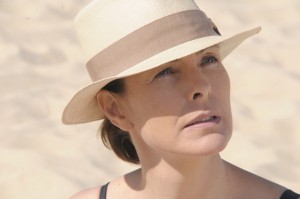
Carole Bouquet in BAD GIRL
This year, no other star makes as defiantly an insouciant entrance as Bad Girl’s Carole Bouquet, first seen strung out on smack reclining in a bubble bath with her female lover, which is why she forgot to pick up her daughter from school. In this supporting role, Bouquet reveals much about her high-fashion model/errant parent with one cool glance. Alice would never win a mother of the year award, and one of the many flashbacks further illustrates why: her daughter and only child, Louise, then about eight, saunters through one of her mom’s parties, with couples making out, drugs everywhere, and takes sips of champagne unsupervised. The mood swinging drama’s based on the 2009 novel by Justine Lévy, daughter of philosopher and media star Bernard-Henri Lévy and the late fashion model Isabelle Doutreluigne (yup, it’s quasi-autobiographical), and directed by her partner, actor-turned-director Patrick Mille, who co-adapted with Lévy.
Louise grows up to become a noted writer, and in her private life, a liar and as self-indulgent and mercurial as her mother. But maybe it’s the hormones? She’s pregnant, a revelation she deliberately and guiltily hides from Alice, who has stage-four breast cancer. The film’s tone never once gives in to any sentimentality that its premise might imply. (These tough-minded and self-involved characters would laughingly dismiss a tearjerker like One True Thing.) Even Louise’s father, a world famous rock star (a very good Bob Geldof), tells her that she can’t count on him to help out with his grandchild, and a mother and daughter sojourn to the beach is played more for laughs when Alice loses the fake breast stuffed in her bathing suit.
The film refuses to embrace even its audience. Take that as praise and a warning. For example, in another flashback, Alice takes a young Louise to see Pasolini’s The Canterbury Tales, and talks and laughs loudly through it, disrupting the movie for other viewers—the worse sin in anyone’s book. And Louise, as an adult, is defiantly headstrong. Everything’s about her, and director Mille lets actress Izïa Higelin vent, causing the pace to drag. The story line is not so different from many American coming-of-age films about a young woman with a wild mother and a distant/absent father (The Playroom, Future Weather, the list could go on), except here Louise comes from wealth and is about 10 years older, though not any more mature.
Fortunately, many of the best films in the series will be released later this year—In the House, Renoir, and You Will Be My Son, about a judgmental, mocking father and his diminished son. It’s I Never Sang for My Father set in a vineyard. All around well acted, it features the first towering performance of the year: Niels Arestrup (A Prophet) as the intimidating père. Definitely look out for this involving drama.

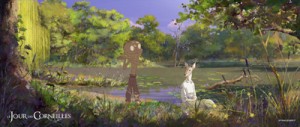















Leave A Comment